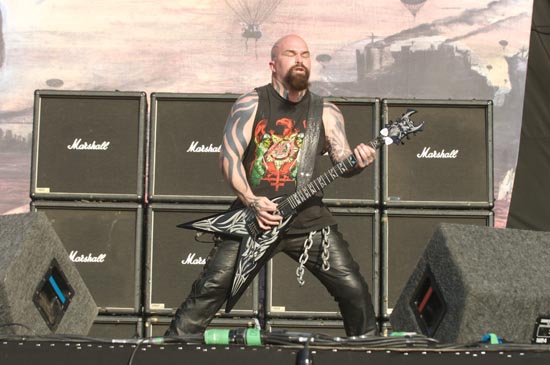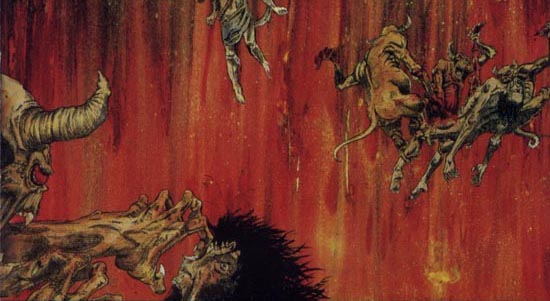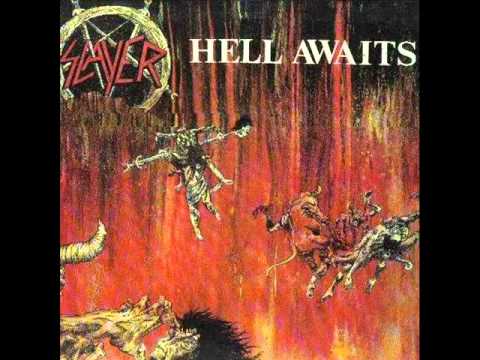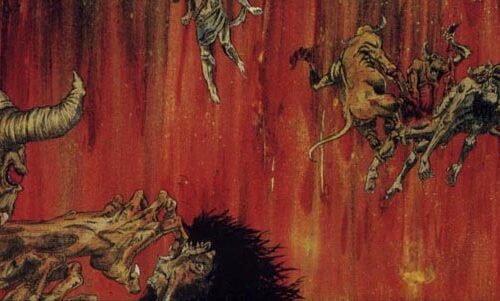It’s staggering to think that it was 35 years ago that the metal world became acquainted with the nastiness of Slayer’s second full album Hell Awaits. Often considered the less offensive little brother to their genre defining Reign In Blood released a year later, Hell Awaits is, for many, a more influential record and one which paved the way for all manner of extreme metal acts which are now considered household names.
Recorded on a tiny budget – certainly by today’s standards – the album had that certain intangible menace that only a few metal records can equal. Part of that was the cover-art itself: a hellish depiction of evil which had none of the low-budget horror look of their previous releases. This was more serious, and consequently made the listener take the album’s seven tracks rather seriously too.
After more than 30 years of thrashing, you’d think Slayer frontman Tom Araya’s right hand would be all gnarly – even missing the odd digit, perhaps. Not so. There’s unexpected warmth in Araya’s grip as he rises from his seat on Slayer’s lavish tour bus, an hour before the band are due to the play the second date of their twice delayed ‘World Painted Blood Tour’.
Araya is quiet though. Detached from the rest of the band who are already inside the venue, and after painful neck surgery from which he is still recovering, Araya’s private time is valuable. Almost proud of his inserts, he immediately shows me his iphone on which there are x-ray images of titanium rivets recently screwed into his neck. Tonight, and for the foreseeable future, Araya will not be headbanging.
So, I remind him. Hell Awaits – it was 35 years ago. Araya smiles as if he almost can’t quite believe it. "Oh wow…shit, really?"
Hell Awaits arrived amid considerable hype, and as a result of its downright evil intentions, the band were famously branded "the most threatening, subversive band on the planet" by respected critic Geoff Barton. Few would argue with that title, but with the exception of Venom, there wasn’t a great deal of competition around at the time either. In Slayer’s terms, it was however a shift towards more overtly evil territory, although when quizzed on the details, Araya doesn’t recall that being intentional. "There was no real thinking behind it being evil. All I knew was that the songs were longer, and everybody else had albums with long songs. They just ended up that way. The rest of the guys came up with their ideas and put them together."

Araya has not historically had much involvement in song writing over the years, but you suspect from what he says he would like more. "I had an idea called ‘At Dawn They Sleep’, which was a song I co-wrote. That was like my first co-writing credit. I did do some stuff on Show No Mercy but didn’t get credit. There’s a lot of stuff…, even up until now, there’s a lot of stuff that I don’t get credit for. That was my first part of really trying to be part of a song."
Araya actually funded the band’s first full album Show No Mercy, but on this occasion the band had a deal with Brian Slagel’s Metal Blade label in Los Angeles, and in a separate interview some weeks earlier, Slagel told me his views: "I remember the budget wasn’t much, maybe $5000.At the time it just seemed like the band were getting together to try some new things."
Slagel also confirms Araya’s suggestion that the album came completely naturally, and then goes on to ‘place’ the album in Slayer’s history: "Compared to Reign In Blood (Slayer’s next and arguably best known album) I actually prefer Hell Awaits. I love both albums obviously, but Hell Awaits has more variety in terms of pace and types of songs."
An evil grin spreads across Araya’s face when I tell him that. "Of course, if he had released Reign In Blood, he would have said the exact opposite," Araya laughs, "He’s right about longer songs though, and that part was intentional.Reign In Blood was intentional, and so was South Of Heaven".
As to Slagel’s financial commitment at that time, Araya seems unmoved. "Back then I didn’t know what the budget was or anything, now I do," he says. "Back then Brian was doing it – he’s going to pay for it, and my only thought was that he was going to get his money back. However that works out, I knew he was going to get it back, and he’s got his money back ten times."
As far as influences go, apparently Slayer weren’t listening to anything particularly unusual during the build up to the recording apparently. "We did covers of Venom, Maiden, Priest. We were listening to the same stuff everybody else was – you can name them all. They were the metal bands. Sabbath was there, Richie Blackmore… Jeff’s a big fan of fuckin’ Richie Blackmore – I found that out last night [laughs]. So those core bands were the ones. Venom was a big influence on Kerry as far as the imagery, and how we did the song-writing. I still think that Welcome To Hell and Black Metal are fucking awesome records, and I still listen to them now actually."

Speaking of imagery – a key part of Slayer’s mystique – Hell Awaits was much less cartoonish than its predecessors, and consequently a lot more challenging, as Araya himself explains. "Show No Mercy’s cover was all done purposely with all that 666 stuff, and even that scared people apparently," he recounts. "But when we did Hell Awaits we had our guy and we told him the name of the album, and that’s what he came up with. We were like ‘Cool’. People always want this deep philosophy as to why we did things; we just thought it was cool. Just like everything else with this band, it just happened. The guy had done the cover for Live Undead and I loved it. It was on a little piece of paper. Then Brian asked him to do this album, and he did it overnight and presented it the next day. We didn’t see it until Brian showed it to us. This guy was an artist and he worked with different materials, so he used water, then drew these things out and cut things out."
From a vocal perspective, some of Hell Awaits tracks put new demands on Araya’s speed of delivery, and at times it seemed like he could hardly fit the words into the songs. "It was all new. Show No Mercy was more of a rock & roll tempo. It was upbeat, but not like we are. But when we played those songs live, we would play them pretty fuckin’ fast. Then it just kept getting faster, and I mean now, I could sing ‘Hell Awaits’ and the songs come out clearly, and I can say them as fast as I need to. You develop a technique, and you just get better at it."
The album’s intro set the tone of the record in grim fashion as it fades in with what sounds like a babbling throng of demons; a weirdly insistent repetition is soon established, and Araya recalls the process. "It sounds like they are saying ‘Slayer’. Gene Hoglan was there, and we were all around the microphone doing all kinds of growling noises. When the whole thing came together, we thought it was very cool. Then we thought we should back-track. Also, because it was our second album, we thought of ‘Welcome back, join us’ backwards. When we heard it played back, we thought that it sounded like they were saying ‘Slayer’. It was unintentional, but shit like that happens in this band. The same thing happened on the new record actually. Jeff had an idea for an intro; he wanted something spoken. We were just going to find something on the internet, but we ended up coming across a friend who did it for us and we were like ‘What? You can speak what language?’ It sounds like he’s speaking backwards."
Sonically Hell Awaits was certainly a more polished affair than anything Slayer had released previously, and Bill Metoyer – the man responsible for some of the engineering work on the album – remembers how organic the whole process was.
"Back then, every album recorded had some kind of financial constraints – it was par for the course. Sometimes we had to go in at midnight to get a cheap studio rate, but we just didn’t know anything else. Having said that, the only real technical difficulties we had were when one of the band spilled beer into the recording console!"
In keeping with a small label’s hands-on approach, Metoyer wasn’t averse to some multi-tasking in those days. "As a member of Metal Blade’s staff, besides working with the Slayer guys in the studio, I would hang out with them a lot," Metoyer remembers. "There were times I had to pick them up at their houses and drive them to radio interviews. I definitely considered them friends."
With the benefit of hindsight, Metoyer sees Hell Awaits as a vitally important release: "I think Slayer progressed both musically and musician wise in every record I worked with them. In that sense I consider Hell Awaits the best album they did for Metal Blade, and judging by how many musicians – including Phil Anselmo and drummer Gene Hoglan – cite Hell Awaits as an influence, then yes it was hugely important. But hell, ALL the records were evil! The first words you hear on Haunting the Chapel are: ‘The holy cross, symbol of lies, intimidates the lives of Christian born’. Since I was raised Catholic, those are some of the most evil words you could say! The thing that gets me is how many people out there still think Reign In Blood was the first Slayer album."

The subject of re-mastering Hell Awaits has been discussed often in metal circles, but Araya isn’t a supporter. "You would lose the warmth of it, I think, because everything is analogue," he suggests. "There is one album that I would I would like to re-record and that’s Divine Intervention. That is one record we would definitely do again. It was so sporadic and scattered. With Christ Illusion and World Painted Blood we were in one spot, and that’s where it stayed, which definitely helps. When you’re writing and moving from one studio to another, you never really focus."
Despite Hell Awaits‘ significance in the overall heavy metal picture, Araya and Slagel have slightly different opinions on its final placing. "I enjoy all our albums," Araya admits with some pride. "They are just all great. Show No Mercy for what it was at the time, is great. We just went in and recorded it, and the same applied to Hell Awaits."




